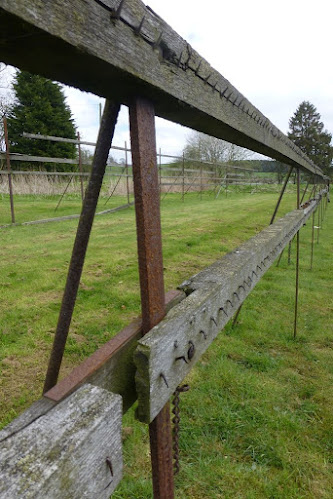We often use words or phrases without considering their history - how they came into being in the first place. However, I am sure that some of you will already be aware of where the term "on tenterhooks" came from. It is a useful expression that describes the tension we feel when waiting for resolution, a decision or an answer.
Back in medieval England, wool was key to England's prosperity and growing might. At Meaux Abbey in East Yorkshire, Abbot Hugh de Leven reported that the lands he oversaw were home to 11,000 sheep. Eastern towns like King's Lynn, Thetford, Lincoln and Norwich grew fat and populous on the back of wool. It was our most important export.
Linked to the wool trade and the woollen industry, techniques were developed to process the raw material including new methods of spinning and weaving. Washing rough woven lengths of cloth was important because of the oils, muck and insect infestations they still contained.
Once this cloth was washed, it needed to be dried when shrinkage could be a problem. To avoid this, the drying cloth would be stretched on wooden frames called "tenters". Nailed into these frames at intervals were strong hooks onto which the cloth was attached and of course these became known as tenterhooks.
By the way, the term "tenter" is derived from a Latin verb that meant "to stretch" - the same root as "tension".





I did know the word and its general meaning, but didn't know exactly what hung on them or what they looked like. An educational post!
ReplyDeleteI've often heard people mistakenly say "tenderhooks". (my laptop autocorrected that to tenterhooks)
There is quite a lot of ignorance around.
DeleteTo be honest I always thought it was tenderhooks. I do enjoy finding out the origin of both words and expressions.
ReplyDeleteA tenderhook would be pretty useless. It needs to be rigid and strong.
DeleteAnd I have learned something new today!
ReplyDeleteAre you on tenterhooks about something?
I am on tenterhooks about how visitors will respond to this blogpost.
DeleteThey also dried kippers on tenterhooks.
ReplyDeleteI have seen pictures of that process.
DeleteWe'll send some through the post next time we're at Craster.
DeleteI am sure our postman will be happy to deliver them as he has suffered from anosmia since contracting COVID.
DeleteWhat? After all these years I have not being hanging on tenderhoooks but rather tenterhooks? Surely half the English speaking population of the world can't have it wrong.
ReplyDeleteYes they have got it wrong Andrew but there are worse crimes I am sure.
DeleteI've used that expression several times and never even thought of its origin. Thanks for sharing!
ReplyDeleteYou are welcome Margaret.
DeleteI looked at the tenter and thought anything on the hooks might be "stretched thin".
ReplyDeleteIt's not the same thing as "on tenterhooks" of course but interesting.
I think it is the same thing.
DeleteYou learn some interesting things from Mr pudding's blog. All my life I thought it was "tender" hooks. Not having any kind of wool industry here very few people would know what a tenter hook would be.
ReplyDeleteAt last you can say it properly... and you a teacher too! Tut-tut!
DeleteI wish people (not you) would use the word properly. In blogs in the past I have read of people being on "tender hooks" and I want to get out my red pen and correct it. I'd forgotten about the original use of tenterhooks and drying/stretching things.
ReplyDeleteA red pen is too lenient for those sinners!
DeleteI guess the word tent comes from the same root, as the first tents were lenghts of cloth attached to poles and hooks and maybe ropes.
ReplyDeleteO.K. and I often muse about the origin of a particular saying or word. Sometimes we make up our own background stories for them; good fun over a Friday night meal of cheese, bread and wine.
"Cheese" - the name comes from when people would "chatter" in a state of "ease" when nibbling this dairy product.
DeleteP.S. I made that up.
Your contributions to our etymological discussions would be very welcome!
DeleteIt's not a word much used these days is it? I know the correct spelling, and might have possibly used it occasionally in the past, but never stopped to consider it's origin. I'm sure Mr Google could give us a lengthy description.
ReplyDeleteMr Google could also ask you up to his apartment to look at his etchings and drink some gin. Be wary Carol!
DeleteLiving near Otterburn, we are familiar with the tenter in your picture and its links to the past when Otterburn mill was a working mill.
ReplyDeleteThanks for calling by and leaving this comment.
DeleteWell I knew what the word was but then I used to spin and should do. When you warp (no jokes please) you take the wool from the loom also onto a gadget fixed to a table.
ReplyDeleteShucks! I wanted to make a joke about warping but you have disallowed it! Spoilsport!
DeleteNot a word I have used but one that I've read before. I always enjoy learning the meaning of words and phrases though.
ReplyDeleteI will be on tenterhooks as I await your next blogpost.
Delete